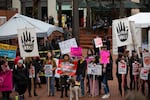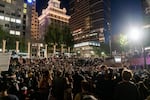Inaugurated on April 6, 1984, Pioneer Courthouse Square was designed to be a multi-use urban park in the core of Portland’s downtown. Its 10-million annual visitors might not realize, however, just how multi-use the city block was in the past.
Where the Square is now was originally home to Central School, Portland’s first permanent public school, that first opened its doors in 1856.
In 1890, wealthy industrialists built the 326-room Portland Hotel in the school’s place — an eight-story behemoth that became the center of the city’s social scene for half a century.
Once its glory days were in the rearview, the Meier & Frank company bought the hotel in 1944, only to have it demolished in 1951 to build a parking garage.

A view of Meier & Frank’s parking structure in 1973 and Pioneer Courthouse Square on Aug. 11, 2023 during the PDX Live concert series — both photos facing Southwest Broadway Street.
Courtesy of the Portland City Archives & Records Management, Caden Perry / OPB
Plans for the city’s public plaza first emerged in 1970 when Meier & Frank petitioned the city to expand its two-level parking garage into an 11-story parking tower. Portland city council and urban planners were galvanized instead to develop a public space, in the hopes of reinvigorating the entire downtown.
After acquiring the block from Meier & Frank, the city held an international design competition in 1980 soliciting proposals for the future of the public space. A Portland-based team, led by University of Oregon graduate Willard Martin, clinched the winning design inspired by the Greek “agora.”
“— Written on Willard Martin’s design sketches of Pioneer Courthouse SquareEarly Greek villages had an agora or small city square often bordered with a stoa (pillared walkway) at the edges … a place for people to gather, sell fish or firewood and discuss the politics of the time.”
Forty years on, Pioneer Courthouse Square continues to serve Portland as a gathering place, whether for the TriMet transportation hub, live events venue and — at times — a space for expressions of civic activism.
“These spaces are super important,” said C.N.E. Corbin, Assistant Professor of Urban Studies & Planning at Portland State University.
“As we move to more of a digital echo chamber, whether it’s through Twitter or TikTok, that ability to engage and show up in place becomes vital to civic processes.”
Even as the Square continues to evolve, it’s worth reflecting how it came to be one of the most visited public sites in Oregon.
From classrooms to stately hotel rooms

An 1858 photo showing Central School on Southwest Sixth Avenue and Morrison Street in Portland, Ore., at the location of what is now Pioneer Courthouse Square. The school opened as the city’s first permanent public school — with an initial class enrollment of 280 students.
Courtesy of the Oregon Historical Society

In 1883, construction began on the block to build Portland’s premiere first-class hotel in a Victorian architecture style, spearheaded first by railroad magnate Henry Villard. The Portland Hotel opened on April 7, 1890.
Courtesy of the Portland City Archives & Records Management

The huge eight-story Portland Hotel, complete with 326 rooms, electric lights and a restaurant, became the center of downtown elite social life. It was the choice venue for visiting celebrities and counted 11 U.S. presidents as guests.
Courtesy of the Portland City Archives & Records Management
The parking lot becomes the public square

The Meier & Frank company, whose flagship store sat a block away on Fifth Avenue and Morrison Street, bought the Portland Hotel in 1944 and then tore it down in 1951 for a parking structure.
Courtesy of the Portland City Archives & Records Management

In the 1980s, city planners moved to revitalize downtown and Pioneer Courthouse Square was its keystone project. Inaugural celebrations for the Square in 1984 attracted over 10,000 people.
Courtesy of the Portland City Archives & Records Management

Counterprotesters gather at an Oregon Right to Life rally at Pioneer Courthouse Square in Portland, Ore., to speak out for women's rights on Jan. 19, 2019.
Meerah Powell/OPB

Massive crowds gathered in Portland, Ore., for a fourth evening of protests over the killing of George Floyd, a Black man from Minneapolis who was killed after an officer pushed his knee into his neck for nearly nine minutes on June 1, 2020. Unlike previous nights of protests, there was a limited police presence on Portland streets, and demonstrators remained peaceful throughout five hours of marching.
Jonathan Levinson / OPB

Learn more about Portland’s early city developments:
- “Portland Noir” revisits the city’s darker history as a major Northwest trading center in the mid-1800s, filled with tales of shanghaied sailors, opium dens and lawlessness.
- “Streetcar City” takes a look back at Portland’s historic streetcars, once one of the most extensive streetcar systems in the country.
